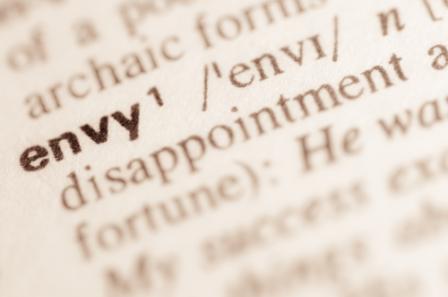How Not to Be Envious
We’ve already tamed the green-eyed monster by learning how not to be jealous. Now, by request from Sonia A. from Phoenix, AZ, we cover another emotion of inadequacy: envy. From Savvy Psychologist Dr. Ellen Hendriksen: the two types of envy and five ways to conquer them.
Envy is universal. And no matter how successful one becomes, envy never really stops (until you decide it does). For example, just search online for “billionaire yachts.” What drives them to one-up one another? Do they need two helicopter landing pads? Or is it envy? My money’s on the latter.
Like jealousy, envy is a complex, blended emotion: it’s a mix of inferiority, hostility, and resentment. We feel envious when we negatively compare ourselves to someone we perceive as being more accomplished, wealthy, or generally superior.
But it gets more complex: according to a 2015 study, there are actually two types of envy. The first is called benign envy, which is an envy that motivates you to improve yourself. Your envy inspires you to try to attain what others have. You want to level up.
By contrast, the second type, malicious envy, makes you resentful, angry, or even wish ill upon those you envy. You want them to come crashing down. Malicious envy is particularly likely if the envied person’s position seems to be undeserved or flaunted.
Benign envy is, by definition, benign—even if it’s likely the most uncomfortable way to motivate yourself. So let’s focus on malicious envy. Here are five ways to snuff the flames next time you’re burning with envy.
Tip #1: Remember all the people you envy are just people. And people get their feelings hurt, their hearts broken, and their egos deflated. Nobody has a perfect life. Everyone has issues and struggles—enough to fill that Birkin bag. If you envy someone their perfect life, simply get to know them better—I promise you they’re human after all.
Tip #2: Befriend those you envy. One school of thought is that if you envy someone, they’re probably doing something right. They’re where you want to be. So even though it’s counterintuitive, reach out to those you envy. Compliment her (genuinely, not snarkily). And then, find out how she does it. You’ll go from envy to inspiration. (And, as a bonus, by getting to know her better, you’ll confirm Tip #1).
Tip #3: Try some healthy downward social comparison. Envy is caused by what psychologists call upward social comparison—you compare yourself to those who you see as superior to you. By contrast, in downward social comparison you compare yourself to those less fortunate, which makes you feel better about yourself.
However, there are two ways to do this. The unhealthy way is to simply replace your negative upward envy with the downward equivalent: scorn. The goal isn’t to disparage those you think are beneath you. Instead, compare down with gratitude and appreciation. Think “there but for fortune go I,” not “I pity the fool.” Your grandmother knew all about downward social comparison; she just called it “counting your blessings.”
Interestingly, those you wouldn’t think of as particularly lucky do this spontaneously. For example, an old 1985 study in the prestigious Journal of Personality and Social Psychology found that women fighting breast cancer, when comparing themselves to others, made downward comparisons to other, less fortunate patients up to 90% of the time.
Tip #4: Remember that the things that really matter can’t be quantified. A problem with envy is that it’s inherently comparative. And to compare, you have to be able to measure something: number of friends, size of paycheck, number of YouTube subscribers.
But the things that really matter are the things that can’t be quantified—goodwill, love, happiness, satisfaction with life. It’s easy to get obsessed about quantity, so shift your focus to quality and feel your blood pressure subside.
Tip #5: You can never win, unless you decide to. There will always be someone richer, hotter, smarter, more accomplished, or generally more impressive than you. Someone with a later model Tesla will take your charging station in Aspen. Someone’s penthouse will block your view in St. Barts. No matter how much you have, it will never be enough. Until you decide it is. When you’re satisfied with what you have, rather than envious of what you don’t have, by definition you’ll have conquered envy.
To sum up, today, you may envy your friend’s promotion, relationship, or perfect children, but, as they say, the only constant is change. Without a hint of gloating or schadenfreude, you may envy others today, but tomorrow you may find yourself the (gracious) envied. In the meantime, try one of the 5 tips and you’ll feel more peaceful, less inadequate, and a lot less envious.
REFERENCES:
Lange, J. & Crusius, J. (2015). Dispositional envy revisited: Unraveling the motivational dynamics of benign and malicious envy. Personality and Social Psychology Bulletin, 41, 284-294.
Wood, J.V., Taylor,S.E., & Lichtman, R.R. (1985). Social comparison in adjustment to breast cancer. Journal of Personality and Social Psychology, 49, 1169-1183.
Image courtesy of Shutterstock.







